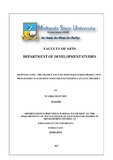Please use this identifier to cite or link to this item:
https://cris.library.msu.ac.zw//handle/11408/3516Full metadata record
| DC Field | Value | Language |
|---|---|---|
| dc.contributor.author | Matundu, Nyasha | - |
| dc.date.accessioned | 2019-04-03T10:38:42Z | - |
| dc.date.available | 2019-04-03T10:38:42Z | - |
| dc.date.issued | 2017 | - |
| dc.identifier.uri | http://hdl.handle.net/11408/3516 | - |
| dc.description.abstract | In Zimbabwe, food security has been always a major challenge in parts of the country especially in the rural areas and many households in the country remain food insecure. Maize being the staple food for the nation and a strategic crop for food self-sufficiency for the nation it been suppressed due to the lack of effective economic policies and this has resulted in the low production of the crop amongst the farmers especially communal farmers in th e country. Developing countries have realized the importance of maize production and implemented input scheme programmes to act as a supporting pillar to the already existing agricultural efforts to boost agricultural production to promote food security as well as to boost the nation’s economy. However, food security is under threat due to low production of maize especially in communal farmers as compared to the A1 and the A2 farmers. This resulted in the predictions of household food security being under threat due to the continuous underutilization of the available land amongst other factors. The Government’s effort in trying to reverse the decline in maize production and promote the nation’s food self-sufficiency has been mainly centered on sponsored input scheme programmes but this will only sustain the nation for a short period. Regardless of production gains derived from increased input utilization, sustainable production can also be achieved through effective use of the available resources and effective economic policies. | en_US |
| dc.language.iso | en | en_US |
| dc.publisher | Midlands State University | en_US |
| dc.subject | Food security | en_US |
| dc.subject | Zimbabwe | en_US |
| dc.title | The significance of enhanced maize production programme in ensuring food self-sufficiency in Gutu district | en_US |
| item.grantfulltext | open | - |
| item.languageiso639-1 | en | - |
| item.fulltext | With Fulltext | - |
| Appears in Collections: | Bachelor Of Arts In Development Studies Honours Degree | |
Files in This Item:
| File | Description | Size | Format | |
|---|---|---|---|---|
| Nyasha's Dissertation.pdf | Full Text | 8.95 MB | Adobe PDF |  View/Open |
Page view(s)
258
checked on Dec 23, 2025
Download(s)
178
checked on Dec 23, 2025
Google ScholarTM
Check
Items in MSUIR are protected by copyright, with all rights reserved, unless otherwise indicated.



